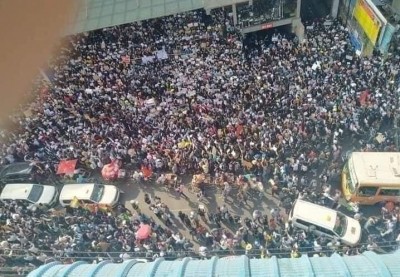Subir Bhaumik
Kolkata, March 1 : The UN Human Rights Office says it has “credible information” of at least 18 deaths across Myanmar on Sunday during a crackdown on anti-military protesters.
Unofficial sources say the death toll could be anywhere between 25 and 30, as quite a few protesters were reported missing. More than 30 protesters were wounded, rescue workers and the Burmese media said.
“The deaths reportedly occurred as a result of live ammunition fired into the crowds in Yangon, Dawei, Mandalay, Myeik, Bago and Pokokku. Tear gas was also reportedly used in various locations as well as flash-bang and stun grenades,” the UN Human Rights Office said in a statement.
“We strongly condemn the escalating violence against the protesters in Myanmar and call on the military to immediately halt the use of force against peaceful protesters,” UN Human Rights Asia spokesperson Ravina Shamdasani was quoted as saying.
This surely would be the highest single-day death toll of protesters since the military seized power on February 1.
The protesters, whose ranks have swelled by each passing day across Myanmar, are demanding that the elected government of Aung San Suu Kyi be restored to power.
An Associated Press journalist, Thein Zaw, was taken into police custody on Saturday while covering the protests who is yet to be released. As many as 850 protesters have been arrested until the weekend and the numbers are likely to swell.
The Democratic Voice of Burma reported that as of 5 pm in Myanmar, there had been 19 confirmed deaths in nine cities, with another 10 deaths unconfirmed. The independent media company broadcasts on satellite and digital terrestrial television, as well as online.
Pictures of shell casings from live ammunition used in assault rifles were posted on social media. Reports on social media identified by name one young man believed to have been killed in Yangon. His body was shown in photos and videos lying on a pavement until other protesters were able to carry him away.
A violent crackdown also occurred in Dawei, a much smaller city in south-eastern Myanmar, where local media reported that at least three people were killed during a protest march.
Photos posted on social media showed a wounded man in the care of medical personnel, and later laid out in a bed under a blanket with flowers placed on top.
The coup reversed years of slow progress towards democracy after five decades of military rule.
Last week, the junta unleashed armed thugs, believed to be former soldiers, on the protesters to break the swelling demonstrations after riot police action using teargas, water cannons and stun grenades failed to disperse them.
The thugs fired iron balls from slingshots and stabbed the protesters with long knives but their small numbers were soon overwhelmed by tens of thousands of protesters.
Eye-witnesses said that the police and the soldiers, who did not try stop the thugs, intervened to protect them when they were outnunbered.
Suu Kyi’s National League for Democracy (NLD) would have been installed for a second five-year term in office, but the army blocked the parliament from convening and detained her and president Win Myint, as well as other top members of Suu Kyi’s government and the NLD party.
Sunday’s violence erupted in the early morning when medical students were marching in Yangon’s streets near the Hledan Centre junction, which has become the gathering point for the protesters who then fan out to other parts of the city.
Videos and photos showed protesters running away as the police charged at them, and residents setting up makeshift roadblocks to slow their advance.
Sounds of gunfire could be heard in the streets of Yangon and there were what appeared to be smoke grenades thrown into the crowds.
“The Myanmar security forces’ clear escalation in use of lethal force in multiple towns and cities across the country in response to the mostly peaceful anti-coup protesters is outrageous and unacceptable, and must be immediately halted,” said Phil Robertson, deputy Asia director for New York-based Human Rights Watch.
“Live ammunition should not be used to control or disperse protests and lethal force can only be used to protect life or prevent serious injury. The world is watching the actions of the Myanmar military junta, and will hold them accountable,” he said.
Disclaimer: This story is auto-generated from IANS service.

